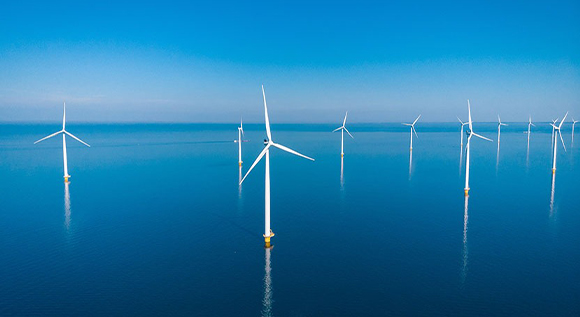The winds of change are blowing over the North Sea
The North Seas countries agree that offshore wind power is key to reaching carbon neutrality. That is why they are calling for a European policy framework to improve cooperation on the use of offshore wind energy.
 © stock.adobe.com/Fokke
© stock.adobe.com/Fokke
In a joint declaration at the ministerial meeting of the North Seas Energy Cooperation (NSEC) held on 6 July 2020, the ministers and the European Commissioner for Energy, Kadri Simson, highlighted the pivotal role played by offshore wind power in achieving the goals of renewable energy expansion and Europe's climate targets for 2050. The ministers agreed that the vast potential of the North Sea could make a major contribution towards increasing the use of offshore wind energy.
The member states believe that speeding up the implementation of cross-border offshore wind projects in a way that links the North Seas countries together will help to harness this potential. It would thus be possible to reduce both costs and demand for offshore areas. Also, positive effects are expected for electricity trading, industrial growth and employment in the region. All of this, the ministers pointed out, can help to foster Europe's economic recovery.
European Commission called upon to develop an EU-wide framework
Therefore, the ministers stressed the importance of eliminating existing obstacles in order to facilitate the speedy implementation of multinational offshore wind energy projects. In their joint declaration, they call on the European Commission to develop an appropriate EU-wide enabling framework which lays down guidelines for member states on the implementation of cross-border projects, adequate electricity market arrangements, and improved and efficient EU financing. The declaration also serves as a basis for the debate to take place among EU member states during Germany's Council Presidency.
The North Seas Energy Cooperation is a cross-border group that currently comprises nine European states and the European Commission as its members. The focus of the NSEC's work is on the expansion of offshore wind energy and offshore grid infrastructure. In 2020, Germany holds the presidency of the NSEC.
Minister Altmaier: growth rate for offshore wind power must increase considerably
At the meeting, Economic Affairs Minister Peter Altmaier highlighted the essential role played by joint and hybrid offshore wind projects in reaching the energy and climate targets for 2050. 'The potential European contribution of offshore wind energy by 2050 is more than ten times today's installed capacity of 22 GW. To this end, annual installation rates of currently 3 GW per year will have to scale up considerably in the coming years,' Altmaier said.
A common path that is not without obstacles
However, the path towards this goal is not without obstacles. These include different national provisions regarding the use of the sea bed, substantial coordination efforts in implementing joint and hybrid projects, and potentially unbalanced allocation of costs and benefits across the involved member states. Also, there are competing interests regarding the use of scarce offshore areas for offshore wind infrastructure, on the one hand, and for international trade on the other.
Therefore, in addition to calling for an EU-wide enabling framework, the member states also pledged to enhance coordination on the design and timing of offshore wind auctions and methodologies to assess the distribution of costs and benefits of the joint and hybrid projects. Apart from that, the ministers and the European Commissioner want to better dovetail offshore grid planning with onshore grid connections of offshore wind farms. Also, maritime spatial planning and offshore grid planning are to be better coordinated in order to further speed up the expansion of offshore wind power across the region.
Specific proposals to be further elaborated by end of 2020
European Commissioner Kadri Simson is certain: 'Only by stronger cross-border cooperation, such as between the North Seas countries, will we be able to sufficiently scale up renewable energy production and make Europe the first climate-neutral continent.'
To this end, the second half of Germany's NSEC presidency will offer the opportunity to further elaborate specific proposals for enhanced maritime spatial planning, offshore grid planning and the role to be played by offshore renewable energy generation, including hydrogen, up to 2050.
Belgium's Minister of Energy Marie-Christine Marghem has offered to take over the NSEC presidency in 2021. The ministers and the European Commissioner will reconvene at the next Ministerial Meeting of the North Seas Energy Cooperation in Brussels in December.
Further information
- Joint press release (Federal Ministry for Economic Affairs and Energy/NSEC): North Seas countries call for European enabling framework for offshore wind energy cooperation on the way to climate neutrality
- Joint press release by North Seas countries and the European Commissioner for Energy (PDF download, 609 KB)
- Article by the Federal Ministry for Economic Affairs and Energy: The North Seas Energy Cooperation
- Article by the Federal Ministry for Economic Affairs and Energy: What exactly is the North Seas Energy Cooperation?

